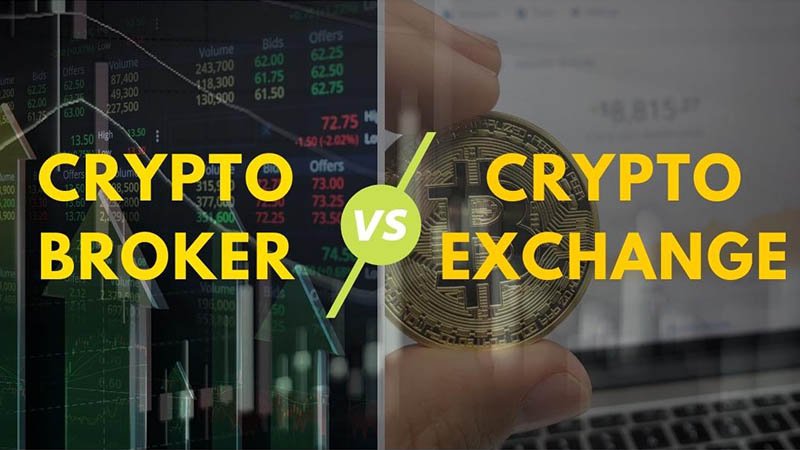
Choosing Your Crypto Battlefield: Exchange or Brokerage?
The world of cryptocurrencies is, without any doubt, fascinating. No wonder so many individuals are becoming more and more curious about the opportunities to earn these digital coins and magnify their current fortune through rewarding investments. Luckily, there are a bunch of means that can help you find the necessary assets and start trading them efficiently. The question is which type of trading platform is a better option: an exchange or a brokerage? This review was written not to answer this question for you but to clarify the key features of both types of solutions and motivate you to make your own informed decision.
Introducing Two Kinds of Solutions
A cryptocurrency exchange is a term that refers to a virtual space through which users can operate digital coins the way they need — buy, sell, exchange, trade, or invest. In addition to listing virtual coins, exchanges enable operating cryptocurrency-based pairs, such as BTC/USD. It’s rare for exchanges to offer assets beyond the crypto market but there are some decent solutions that also explore the sectors of foreign exchange, stocks, and commodities. These platforms can greatly benefit from the introduction of new blockchain-based technologies like non-fungible tokens or staking. They can use these solutions to attract a wider community and engage current community members to take part in the exchange process more eagerly.
Basically, in the crypto world, brokerage companies don’t differ a lot from the ones working in the stock sector. Like stock brokers, cryptocurrency brokerage services act as intermediaries that enable purchases and sales of tradable instruments. The conceptual dissimilarity between crypto brokers and exchanges is that brokerages don’t enable direct access to digital assets. They offer derivative instruments and contracts for difference that allow individuals to speculate on price fluctuations rather than earn actual value on their holdings. Basically, when working with brokers, crypto traders don’t own the underlying assets.
The Advantages of Crypto Exchanges
- Actual ownership and direct operations: You don’t need any extra instruments to trade coins through exchanges. All you need is to create a wallet and store some coins to start selling them when it’s profitable or buy them and expect further price growth.
- A rich selection of products: The cryptocurrency market is constantly growing and introducing new promising concepts. That’s why it would be a benefit to trade on an exchange that regularly refreshes its listings and adds new digital currencies.
- Increased liquidity: The growing popularity of direct exchanges makes this type of platform a more efficient method to ensure highly liquid trading. Huge trading amounts on some of the largest exchanges ensure that you’ll always find users to sell or buy assets at reasonable prices.
- Serious security measures: Crypto exchanges that mind their reputation among the community prefer a thorough approach to cybersecurity. That’s why they enable such reliable measures as cold wallets, IP whitelisting, two-factor authentication, and others.

The Disadvantages of Crypto Exchanges
- Regulatory Uncertainty: Many crypto exchanges operate in a regulatory gray area, leading to uncertainty about legal requirements and potential sudden changes that could impact their operations.
- Lack of investor protection: Unlike traditional financial markets, many crypto exchanges lack comprehensive investor protection measures, exposing users to risks such as hacking, fraud, and market manipulation.
- Market manipulation: The relatively nascent and unregulated nature of the cryptocurrency market makes it susceptible to manipulation, including pump-and-dump schemes and wash trading.
- Exchange vulnerabilities: Centralized exchanges are vulnerable to single points of failure. If an exchange experiences a breach or faces insolvency, users’ funds are at risk.
- Withdrawal restrictions: Some exchanges impose withdrawal limits or lengthy verification processes, hindering users’ ability to access their funds when needed.
The Advantages of Brokerages
- Customer Support: Crypto brokers tend to provide better customer support, offering assistance to users in a more personalized and timely manner compared to some crypto exchanges.
- Fiat on-ramps: Many crypto brokers facilitate direct purchases of cryptocurrencies using traditional fiat currencies, eliminating the need for users to first acquire cryptocurrencies before trading.
- Diverse payment methods: Crypto brokers often support a variety of payment methods, including credit/debit cards, bank transfers, and even alternative payment systems, making it easier for users to fund their accounts.
- Regulated environment: Some crypto brokers operate within regulated frameworks, providing users with a sense of security and adherence to legal requirements.
- Leverage and derivatives: Certain crypto brokers offer leverage and derivative trading options, allowing users to amplify their exposure to market movements and potentially enhance profits.
- Educational resources: Many crypto brokers provide educational materials and resources to help users understand trading strategies, market analysis, and risk management.
- Automated trading: Some crypto brokers offer automated trading tools and algorithms, allowing users to implement predefined strategies without constant manual intervention.
- Lower fees: While this can vary, some crypto brokers may offer more competitive fee structures compared to certain crypto exchanges, reducing trading costs for users.
- Quick execution: Crypto brokers often prioritize quick order execution, minimizing slippage and ensuring that users’ trades are executed at or near the desired price.
- Investment services: Certain crypto brokers offer investment services, allowing users to allocate funds to managed portfolios or follow the trades of experienced traders.
The Disadvantages of Brokerages
- Lack of digital assets selection: Although these companies specialize in cryptocurrencies, they might not offer peculiar assets due to regulatory requirements or other issues.
- Lack of control over your funds: When you trade through the intermediary service, you trust your funds to the company, meaning your control over them is not as solid as it could be if you stored them in a crypto wallet.
- Direct exchanges disabled: You don’t own underlying assets, so you cannot trade them directly — only speculation through contracts and other instruments is available.
Conclusion
Before you make a final decision, make sure to do your own research on all the benefits and downsides of both exchanges and crypto brokers. Explore specific features of peculiar platforms, study their performance, look for reviews from other traders, and never neglect the possibility of learning more about security measures and fund protection tools.




